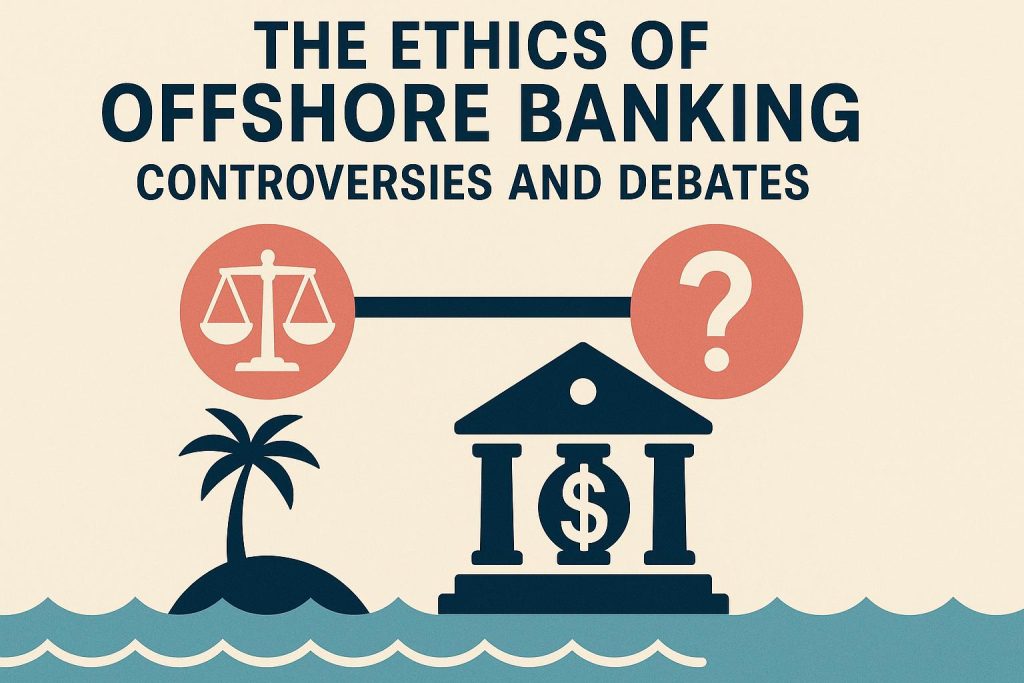The Ethics of Offshore Banking: Controversies and Debates

The Concept of Offshore Banking
Offshore banking refers to the management of financial assets in a foreign country where the depositor is not a resident. This practice is common among individuals and corporations who seek jurisdictions with favorable tax laws and regulations. Such jurisdictions, often labeled as tax havens, are known for offering financial privacy, reduced taxation, and a wide array of investment opportunities. Understanding the intricacies of offshore banking is essential for evaluating its advantages, addressing ethical concerns, and navigating the legal landscape that surrounds it.
Advantages of Offshore Banking
Offshore banking is considered a valuable financial strategy for both individuals and corporations due to its several potential benefits. A primary advantage is the aspect of tax efficiency. Certain offshore banks offer significantly lower tax rates or even tax exemptions that enable account holders to reduce their tax obligations legally, thus optimizing their financial strategy. This inherent ability to minimize tax liabilities represents a powerful incentive for considering offshore banking options.
Moreover, offshore accounts are often associated with increased privacy and confidentiality. In some jurisdictions, banking secrecy laws are highly stringent, providing an additional layer of discretion for account holders. Such privacy measures ensure that financial details remain inaccessible to unauthorized entities, offering a sense of security and peace of mind.
An added benefit to offshore banking is the diversification of assets. By distributing funds and investments across various countries, individuals and corporations can lower their exposure to economic volatility inherent to their home countries. This strategic allocation of assets can mitigate risks associated with market fluctuations or political instability.
Furthermore, offshore banking facilitates access to global investment opportunities. Account holders can invest in diverse financial instruments and markets that may not be readily available in their home countries, potentially leading to higher returns. This access to a broader spectrum of investment choices empowers individuals and corporations to construct well-rounded investment portfolios.
Ethical Concerns and Controversies
Despite the advantages, offshore banking is not free from ethical concerns and controversies, which highlight its potential misuse and the broader implications for societies. A major issue is tax evasion. Offshore accounts may be leveraged to conceal income and assets, thus evading the rightful tax obligations. This undermines national tax systems and negatively affects government revenue, essential for public services and infrastructure development.
The concern extends beyond tax evasion to include money laundering. Offshore banking can be exploited by individuals or entities to obscure illegally-obtained funds, sanitizing them through legitimate financial channels. This misuse can exacerbate activities related to corruption, criminal enterprises, and even terrorism.
Additionally, there is criticism surrounding the impact of offshore banking on economic inequality. Critics argue that offshore banking primarily benefits the wealthy, who have the means to shift resources abroad, potentially widening the wealth gap. This raises questions about fairness in the global economic system and the implications for social equity.
Legal and Regulatory Challenges
Addressing the complexities of offshore banking involves legal and regulatory answers from governments and international organizations. Recognizing the need for transparency and enforcement, various initiatives have been introduced to tackle the challenges of offshore banking.
The OECD’s Base Erosion and Profit Shifting (BEPS) project represents a collective effort to close loopholes that facilitate profit shifting and tax avoidance. The BEPS framework aims to ensure that profits are taxed where economic activities occur, discouraging exploitative tax practices.
Furthermore, the Common Reporting Standard (CRS) has been adopted by numerous countries to establish a system for the automatic exchange of financial information among jurisdictions. This measure aims to curb tax evasion by fostering greater transparency and accountability within the banking industry.
In many regions, increased scrutiny and regulatory measures are being implemented to ensure compliance with international norms. Financial institutions engaged in offshore banking are required to adhere to strict compliance protocols, contributing to a more accountable and transparent financial environment.
The Future of Offshore Banking
The trajectory of offshore banking is anticipated to be influenced by ongoing regulatory reforms and technological advancements. As global collaboration among countries intensifies, it is expected that the secrecy traditionally associated with offshore banking will decrease. Governments around the world are continuing to close regulatory gaps, creating a more robust framework for offshore financial activities.
At the same time, technology is poised to play a pivotal role in transforming offshore banking. Innovations in financial technology can bolster transparency and compliance, while redefining the ways in which financial assets are managed. Emerging technologies such as blockchain and digital identities may offer new pathways for secure and efficient financial operations.
Ultimately, the ethical facets of offshore banking will remain an area of significant debate. While the system can deliver legitimate benefits, the risks associated with its misuse necessitate careful management through robust regulations and ethical financial strategies. As global standards and expectations evolve, the balance between privacy, efficiency, and compliance will remain central to discussions surrounding the future of offshore banking.
In summary, offshore banking embodies a complex interplay of advantages, ethical considerations, and legal challenges. Understanding these dimensions helps demystify the practice and supports informed decision-making in navigating its multifaceted landscape. Through enhanced cooperation and advancements in technology, offshore banking could transition toward greater scrutiny and responsibility, aligning its operations with evolving global norms and expectations.
This article was last updated on: October 9, 2025
